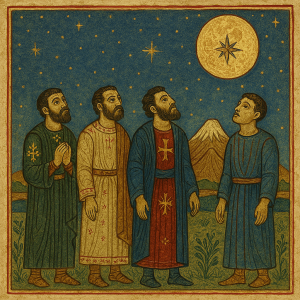Joseph’s Courage to Raise the Child
Armodoxy for Today: Joseph’s Courage to Raise the Child
In the days and weeks that follow the Theophany, we learn more of the background – foundational – story to the Nativity. Do not suppose that these stories as history lessons, rather find in them the strength to meet your challenges – physical, spiritual or within your relationships with others. In these stories we are to understand how to live our lives fully.
Last time I shared with you some highlights about St. Joseph’s life. As mentioned, very little is written about him in Holy Scriptures, but from that little we know that he was a devout and God-fearing man. We know his strength was not only by his physical prowess as a carpenter, but in his moral fortitude. He was unwilling to discredit his wife. Being obedient to the messenger of God, even when all the facts gave him reason to doubt, he took on the responsibility of being the adoptive father of Jesus. In that act of compassion, Joseph did not allow Jesus to be referred to as “illegitimate,” or as an “orphan.” Nor did he allow Jesus to be treated as anything less than his own son. In Gospels, people question Jesus’ authority by asking, “Is he not the son of the carpenter?” (Matthew 13:55) From this statement, it’s obvious that Jesus was accepted and regarded Joseph’s true son.
In learning about Joseph, we are given an example for living. We see true strength. We understand what it means to be obedient to God’s word. Joseph prayed, believing that “Thy Will be done” would take place when he, Joseph, agreed to take part in God’s will. In fact, his actions allowed God’s will to be done here on earth as it was in heaven.
As the adoptive father of Jesus, Joseph displayed courage and immense love for his wife and her child. Former president Barak Obama, in commenting about responsible fatherhood in working on the Strong Communities initiative, said, “What makes you a man is not the ability to make a child, but the courage to raise one.” Joseph teaches us the true virtues of parenthood – it is the courage to give, sacrifice and to love another human being as your own. He raised Jesus Christ from infancy to adulthood and gave him the necessary support in preparation for the Divine ministry and to ultimately rise to the Cross and conquer it.
This example drove the Armenian Church to be, in a sense, the adoptive parent of the Armenian people, never allowing the people to be orphaned or feel “illegitimate” in the absence of a state, or country. When you plug into Armodoxy, you’re plugging into the other parent that connects you to the bigger family of God.
We pray, Lord our God, as we accept the challenges of the day and days before us, may the example of Jospeh’s integrity, perseverance and clarity of focus inspire within me the opportunity to share in God’s Kingdom. May Your Kingdom come, may Your Will be done and may I find the courage to love and sacrifice for others. Amen.

 burning fiery furnace, and He will deliver us from your hand… But if not, let it be known to you… that we do not serve your gods, nor will we worship the gold image which you have set up.”
burning fiery furnace, and He will deliver us from your hand… But if not, let it be known to you… that we do not serve your gods, nor will we worship the gold image which you have set up.”
